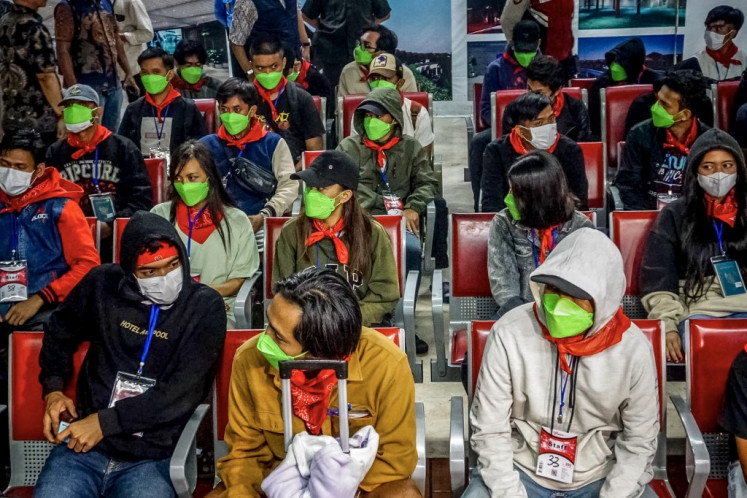Popular Reads
Top Results
Can't find what you're looking for?
View all search resultsPopular Reads
Top Results
Can't find what you're looking for?
View all search resultsRI remains safe despite drop in May: Fitch
Indonesia’s declining foreign exchange reserves are not yet a problem, but authorities must remain cautious by continuously monitoring weaknesses in the sovereign’s external finances, according to international rating agency Fitch Ratings
Change text size
Gift Premium Articles
to Anyone
I
ndonesia’s declining foreign exchange reserves are not yet a problem, but authorities must remain cautious by continuously monitoring weaknesses in the sovereign’s external finances, according to international rating agency Fitch Ratings.
“Valuation effects have made a significant contribution to the May decline, alongside central bank intervention aimed at supporting the rupiah,” the rating agency said in a statement.
More broadly, global risk aversion, driven by the eurozone debt crisis, prompted offshore investors to sell Indonesian equities after several years of inflows. “This phenomenon is far from unique to Indonesia, where bond market flows appear more balanced so far,” Fitch said.
Bank Indonesia’s foreign exchange reserves declined to US$111.53 billion at the end of May from $116.41 billion recorded in April.
The decline in May brought the reserves back below the level achieved at the end of February, erasing $5.92 billion of gains in April, during which the country boosted foreign exchange reserves using a $2.5 billion sovereign bond issue.
According to Fitch, Indonesia’s open capital account makes the risk of destabilizing short-term capital flows unavoidable.
“The need to further strengthen the external finances through foreign exchange reserve accumulation has therefore long been a factor in our ratings analysis. The sharp fall in official reserves of over $10 billion in September last year, for example, showed the risks associated with movements in local equity, debt, and foreign exchange markets,” Fitch said.
Fitch also said that the recent drop needed to be viewed in the context of the build-up in reserves, which are almost double the July 2008 level of $57 billion.
“As we noted in December 2011, reserve accumulation had helped improve Indonesia’s liquidity ratio — our key measure of a sovereign’s capacity to handle an external liquidity shock — moving it closer to, but not quite level with, the ‘BBB’ category median,” Fitch said.
Fitch, therefore, believed that the magnitude of the fall in reserves would not pose a problem in the short run.
“That said, it remains a factor that we will monitor, especially given the potential risk of capital flight, stemming from a sharp and sustained shock to foreign and domestic investor confidence,” Fitch said.
Separately, Standard Chartered economist Fauzi Ichsan also said that he believed Bank Indonesia currently had more than enough reserves to intervene in the market for the sake of maintaining the rupiah rate amid growing pressures from the global crisis.
However, Fauzi also said that despite Indonesia’s strong internal resiliency to withstand the crisis, all authorities had to closely monitor developments in the eurozone region, the epicenter of the crisis, which could affect the rupiah’s value in the long run.
“The situation with Greece, if it continues to worsen, will pressure global exchange rates, including the rupiah,” he said.
Greece will decide its fate on June 17 on whether the country will still be a member of the euro currency states or not.
The rupiah was unchanged at 9,438 per dollar as of 3:04 p.m. in Jakarta, according to prices from local banks compiled by Bloomberg. The currency dropped to 9,643 on May 31, the weakest level since October 2009.










